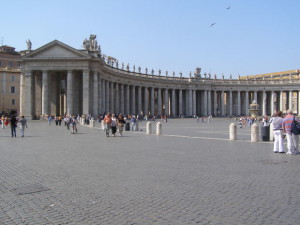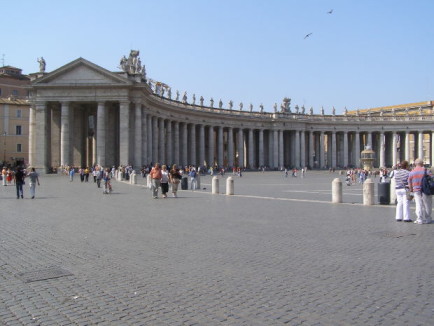I had a reader ask my opinion on the Pope and his latest remarks regarding the economy. I don’t want to put words into anyone’s mouth, so I’ll present the question as it was written:
Hi Kevin! I would love to get your take on the anti-capitalist remarks made by Pope Francis! Do you think you could do a post on this?
I am not only a Catholic, but also someone who believes wholeheartedly in a free market economy. This seems to be right up my alley. 
No, that doesn’t mean looking at what Fox News or MSNBC had to say about his comments. I wanted to read the full statement from the Pope himself. The part regarding economics starts at #50. This way I was able to react with my own thoughts and feelings without being influenced by the commentary of these theoretically unbiased news organizations.
There are a few specific quotes I want to address from that statement.
The Pope Condemns Throwing Away Food
Can we continue to stand by when food is thrown away while people are starving? This is a case of inequality.
As a Catholic, I agree. The Pope is correct to condemn anyone for throwing away food that could be given to hungry people. I think it’s important that I, as a consumer, make sure to give my business to restaurants that donate food to shelters rather than throw it away at the end of the night.
One of my favorite places to eat is Panera, or St. Louis Bread Company (most of you may not know that Panera started in St. Louis as the St. Louis Bread Company, and is still branded that way in St. Louis today). They do a great job of making sure their unsold food is donated to charity.
In addition, I would imagine the Pope isn’t happy that the US Government spent over $2 billion in 2013 paying farmers not to farm. This is an old, stupid liberal idea that government control of prices (by controlling supply) is a good thing for the economy and the people.
This is, in fact, a bad idea not just for the interest of keeping peoples’ bellies full, but also in keeping our economy strong. As you can tell, this program has nothing to do with a free market, and everything to do with stupid government policies.
The Powerful Taking Advantage of the Powerless
Today everything comes under the laws of competition and the survival of the fittest, where the powerful feed upon the powerless. As a consequence, masses of people find themselves excluded and marginalized: without work, without possibilities, without any means of escape.
I’m sure a liberal would read this statement and consider the “powerful” the rich, and the “masses” the middle class and the poor. However, a rich person who starts a company and creates jobs is not excluding and marginalizing his workers; he is including them in the economy and production of valuable goods and services while paying those employees wages.
I read this and think it much more clearly describes the government, the bureaucrats, and the lobbyists who get their power not from money earned honestly, but from the backing of a multi-trillion dollar Department of Defense.
The masses, or normal people like me, are truly left without any means of escape from a government that wants to take 30 cents of every dollar I earn through honest work. In this sense, I completely agree with the Pope.
The Pope Attacks Trickle-Down Economics
…some people continue to defend trickle-down theories which assume that economic growth, encouraged by a free market, will inevitably succeed in bringing about greater justice and inclusiveness in the world. This opinion, which has never been confirmed by the facts, expresses a crude and naïve trust in the goodness of those wielding economic power and in the sacralized workings of the prevailing economic system.
I agree complete with the idea that we should not express “crude and naive trust in the goodness of those wielding economic power.” Where the Pope and I probably disagree is our opinion of who holds economic power.
It sounds like he believes that a few rich people wield the economic power of a nation. However, it is painfully obvious that it is the government who controls the economic power of America. Large corporations lobby the government for favorable tax laws.
Large banks and insurance companies get bailed out by the government instead of being allowed to fail. The government has to power to make almost any law they want to either help or hurt any individual business or industry they want.
In a truly free market, it is not the rich or the government who wield economic power, but it is the consumer. The power rests in the hands of everyday people in a free market, and that’s how it should be in my opinion.
The Pope on Wealth Inequality
While the earnings of a minority are growing exponentially, so too is the gap separating the majority from the prosperity enjoyed by those happy few. This imbalance is the result of ideologies which defend the absolute autonomy of the marketplace and financial speculation. Consequently, they reject the right of states, charged with vigilance for the common good, to exercise any form of control.
In this statement, I believe the Pope is naive. I wish I knew of a country where the free market could reject the right of a state to exercise any form of control. If that country existed then I’d pack my bags and head there immediately.
I honestly don’t know what he is referring to here, because I don’t know of any place in the world where the state doesn’t have control over the economy. Secondly, he is also naive to think that people who work in government and are “charged with vigilance for the common good” are truly more concerned for the common good than they are for their own well being.
Being Catholic and Libertarian is a Great Combination
Here’s the bottom line on the Pope. He is not a politician; he is the leader of a religion. He doesn’t often give his opinion on politics, and when he does, he doesn’t say that all Catholics are required to share in his political beliefs.
I honestly believe the Pope and I have the same political opinions. Our only difference is that while he knows better than anyone that all men and women are sinners, he still believes that a few elected men and women have the moral fortitude and immeasurable intelligence to best run an entire economy. I believe that is best left up to a free market.
Both the Pope and I believe that we should have a government system that best promotes equality and free will, and we just have different opinions on which political system fits that description. Last year I read a great book called Free Is Beautiful: Why Catholics should be libertarian. If you are Catholic (or any Christian denomination for that matter), this might be an interesting read. I recommend it.
Readers: Do you think religious leaders’ political opinions matter?
Kevin McKee is an entrepreneur, IT guru, and personal finance leader. In addition to his writing, Kevin is the head of IT at Buildingstars, Co-Founder of Padmission, and organizer of Laravel STL. He is also the creator of www.contributetoopensource.com. When he’s not working, Kevin enjoys podcasting about movies and spending time with his wife and four children.


Great post, Kevin! As a Christian and a staunch free-market guy, I will definitely be recommending this post to EVERYONE!
This is a really good explanation of the good and not-so-good points of the Pope’s recent guidance on economics. I think you did a thorough analysis of this and I like how you went right to the source before offering your insights. I also liked how you successfully struck a respectful tone as you wrote this article. I am concerned that the Pope might be extremely naive re: free-market economics, but he has shown himself to be a humble man, and hopefully that humility extends to being open to legitimate correction and instruction on the uplifting effects of the free-market system.
Good Post Kevin. I like what you had to say and I think you provided a pretty good case for the merits of free enterprise. I just thought I’d include one of my favorite quotes from Milton Friedman:
So that the record of history is absolutely crystal clear. That there is no alternative way, so far discovered, of improving the lot of the ordinary people that can hold a candle to the productive activities that are unleashed by a free enterprise system.
Yup. Pretty much sums it up right there.
Amen! Great quote! True compassion isn’t taking people’s money and redistributing it. Even less so, compassion should certainly not be defined as curbing the ability of productive people to produce more wealth and prosperity.
Hey Kevin, here is a really good article I read a few days ago… It details how the New Testament provides support for capitalism. I’m a Christian and a committed capitalist, but I had never realized how much weight the Bible throws behind free-enterprise and the productive pursuits of humankind!
Oops it looks like I forgot the link! Here it is –> http://communities.washingtontimes.com/neighborhood/reawakening-liberty/2013/dec/18/what-bible-pope-francis-reading/
I am sorry to say this, but I’ve more or less given up on the idea of a “free market” economy. I am hard pressed to find an example anywhere of a truly free market. I believe wholeheartedly in the merits of free market capitalism, the problem is in the implementation. Because it requires human beings for that, and as we all know individuals are subject to their own biased nature and self serving interests. So can we ever truly have a free market? Whether it’s government corruption itself or outside corporate lobbyists that unfairly sway the economy to meet the needs of a few is inconsequential. That’s just splitting hairs in my opinion. Whether it’s Republicans or Democrats, I can’t seem to find any real difference between the two parties and their corporate sponsors. It’s simply one powerful group looking out for the interests of another powerful group. One hand washes the other it would seem. I was born and raised Catholic. And although I haven’t practiced in years, I do like the new Pope for at the very least taking a stance that might stir some debate. Whether you agree with him or not, hopefully he will provoke some eye-opening discussions… Like your’s Kev.
“I don’t know of any place in the world where the state doesn’t have control over the economy.”
Well, there is Somalia. Somalia has a government of sorts, but it is so dysfunctional that it doesn’t control much of anything. Although you could possibly claim that the true government is the roving street gangs, and then you could claim that *they* control the economy. Or, that Somalia is not really a country, but a loose collection of fiefdoms. Could boil down to semantics.
Definitely going to pick up that book. I love that you wrote this without looking at other media and purely focusing on the Pope’s own words.